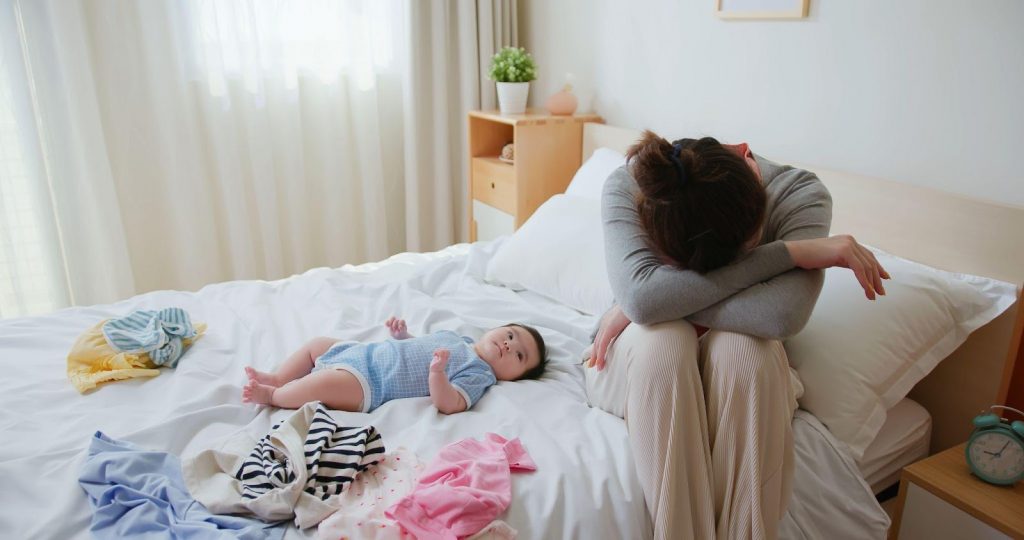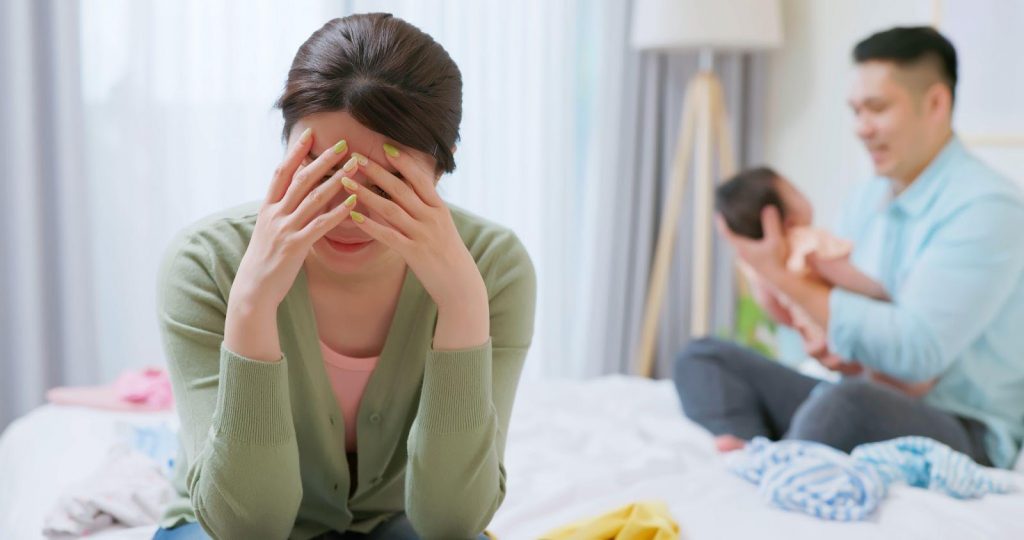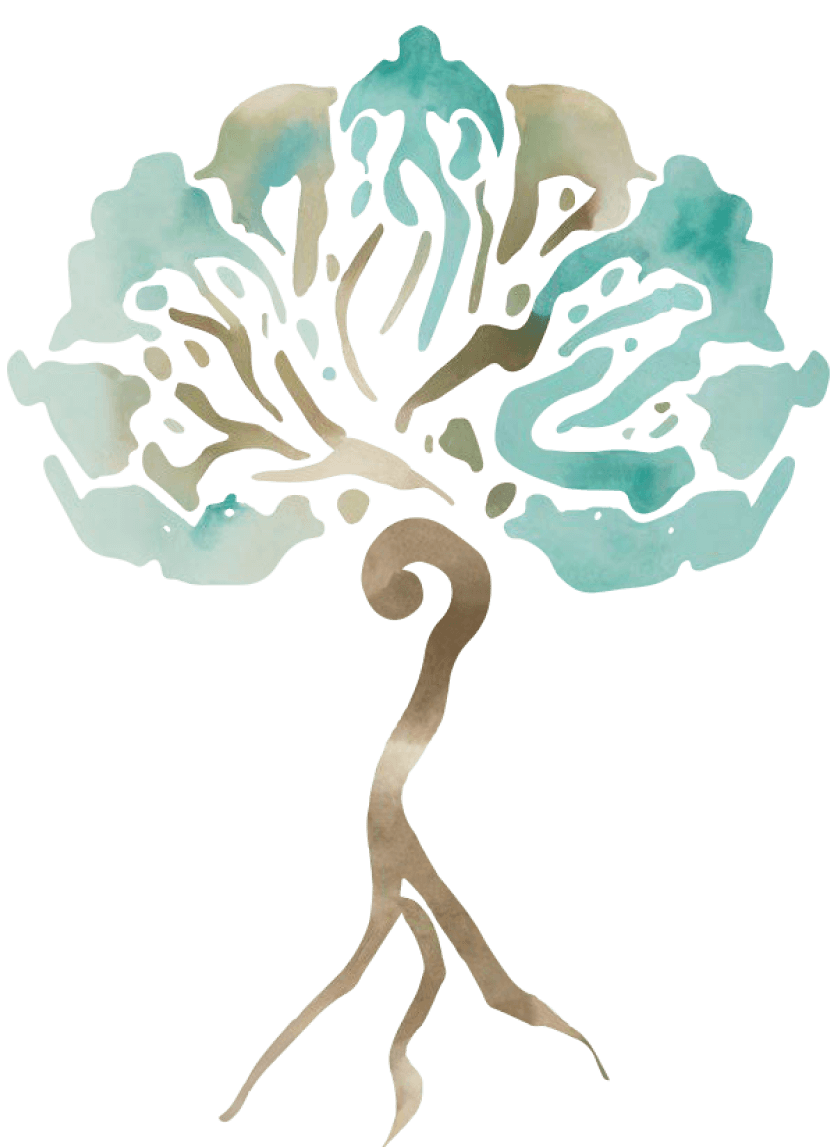Empowering New Mothers: Navigating Postpartum Mental Health in Singapore
Through this blog, we aim to create a supportive dialogue that breaks down the barriers of silence and stigma surrounding postpartum mental health.
Posted on 8 May 2024
Written by
Dr Jared Ng, Connections MindHealth
Welcoming a new life into the world is often portrayed as a time of joy and fulfilment. However, for many women, the postpartum period can bring unexpected mental health challenges. Postpartum depression, anxiety, and other mood disorders can significantly impact new mothers. Despite its prevalence, postpartum mental health remains under-discussed, particularly in places like Singapore, where traditional norms can make it challenging to address these issues openly.
Addressing mental health issues in new mothers is crucial—not just for individuals but also for public health. The implications of postpartum mental disorders extend beyond the individual, affecting infants’ development and family well-being. In Singapore, where family unity is a cornerstone of society, ensuring the mental health of new mothers is essential for nurturing healthy communities.
Through this blog, we aim to create a supportive dialogue that breaks down the barriers of silence and stigma surrounding postpartum mental health. By spreading awareness and fostering understanding, we hope to empower mothers to seek help without fear of judgment. We also aim to encourage a cultural shift — one that recognises the strength of seeking help and the importance of mental wellness for all mothers.

Baby Blues — Typical Mood Changes After Delivery
The arrival of a newborn brings immense joy but can also be accompanied by a range of emotions. It’s important for new mothers to understand that experiencing mood changes shortly after delivery is common. This phenomenon, known as the “baby blues“, affects up to 80% of mothers and usually occurs within the first few days to weeks after childbirth.
What are the Baby Blues?
The “baby blues” describe a short-term period of emotional instability that can include:
- Mood swings: It’s normal for new mothers to experience rapid shifts in mood, going from happiness to sadness without warning.
- Crying spells: Mothers may find themselves crying for no apparent reason, often triggered by something minor.
- Anxiety: Many new mothers feel anxious about their baby’s well-being or their abilities as a mother.
- Irritability: It’s not unusual to feel irritable or overwhelmed by the demands of caring for a newborn.
- Insomnia: Some new mothers may struggle to fall or stay asleep despite feeling exhausted.
These symptoms typically peak around the fourth or fifth day after birth and subside within two weeks. The “baby blues” are believed to be caused by the dramatic hormonal changes that occur after childbirth, along with the stress and exhaustion of caring for a newborn.
Normalising the Baby Blues
Understanding that the “baby blues” are a common part of postpartum adjustment can help new mothers feel less alone and more prepared for the emotional ups and downs of early motherhood. It’s important to remember that these feelings are usually temporary and do not indicate a lack of maternal love or ability.
Beyond Baby Blues – When it is a Mental Health Disorder
While “baby blues” are common and generally short-lived, some new mothers experience more intense and persistent symptoms that indicate a more serious mental health condition. It’s crucial to differentiate between the normal emotional fluctuations of early motherhood and postpartum mental health disorders that require professional intervention. Recognising the signs of conditions like postpartum depression, postpartum anxiety, or psychosis is the first step toward seeking the necessary support and treatment for recovery. In this section, we explore these conditions in greater detail, helping new mothers and their loved ones understand when to seek help.
- Postpartum depression (PPD) is the most prevalent of these conditions, characterised by persistent feelings of sadness, worthlessness, and exhaustion that go beyond the typical “baby blues.” These feelings can last weeks to months and interfere significantly with a mother’s ability to care for her child and herself.
- Postpartum anxiety involves an intense, debilitating worry that is out of proportion to the actual situation. Mothers may experience severe anxiety, panic attacks, and fears about their baby’s health and well-being or their abilities as a mother [1].
- Other conditions: Postpartum Psychosis is rarer but more severe, involving hallucinations, delusions, and extreme confusion. Postpartum Obsessive-Compulsive Disorder (OCD) is marked by intrusive, repetitive thoughts and fears, often centred on the baby’s safety, which the mother knows are irrational but feels powerless to stop.
Recognising the Signs
Recognising the signs of postpartum mental health issues is crucial for early intervention and effective treatment. The symptoms can be diverse, spanning emotional, physical, and behavioural changes that disrupt a new mother’s daily functioning and well-being. Here’s a detailed look at what to watch for:
Emotional Symptoms of Postpartum Depression
- Persistent sadness or low mood: feelings of sadness that last most of the day, nearly every day, not just occasional blues.
- Crying spells: new mothers suffering from postpartum mental health issues may experience frequent, unexplained crying that feels uncontrollable [2].
- Irritability or anger: irritability or anger that is unusual or out of proportion to the situation.
- Feelings of worthlessness or guilt: persistent thoughts of not being a good mother or unwarranted guilt over minor issues.
- Anhedonia: anhedonia is the loss of interest or pleasure in activities previously enjoyed, including withdrawal from social interactions.
Physical Symptoms of Postpartum Depression
- Fatigue: severe tiredness that doesn’t improve with rest, affecting the ability to care for oneself and the baby.
- Sleep disturbances: difficulty falling asleep, staying asleep, or sleeping much more than usual, unrelated to the baby’s sleep schedule [3].
- Changes in appetite: significant increase or decrease in appetite, leading to weight loss or gain unrelated to pregnancy [4].
- Aches and pains: physical symptoms like headaches, stomachaches, or muscle pain without a clear physical cause.
Behavioural Symptoms of Postpartum Depression
- Cognitive impairments: trouble concentrating, remembering details, or making decisions that affect daily tasks.
- Anxiety and panic: excessive worry about the baby or one’s abilities as a mother, possibly escalating to panic attacks.
- Obsessive thoughts: intrusive, repetitive thoughts, often about harm coming to the baby, which the mother recognises as irrational but feels powerless to control [5].
- Avoidance behaviours: avoiding situations or activities due to anxiety or fear, including avoiding caring for the baby.
As mentioned, some of these symptoms can be a normal part of adjusting to motherhood for many. However, when they are intense, persistent, and interfere with daily life, they may indicate a more serious postpartum mental health issue. Early detection and intervention are crucial to managing these symptoms effectively.

From Hormones to Social Pressures—What Contributes to Postpartum Mental Health Challenges?
To effectively address and mitigate postpartum mental health challenges, it is essential to understand the varied risk factors that can influence a new mother’s well-being. These risks are multifaceted and include biological, psychological, and social dimensions, each contributing to postpartum mental health concerns.
In Singapore, additional cultural factors also play a critical role in shaping the experiences and expectations placed on new mothers. By examining these elements, we can better support and empower mothers and ensure they receive the care needed during this transformative period.
Biological factors
- Hormonal changes: The rapid fluctuation in hormones such as oestrogen and progesterone after childbirth can significantly impact mood and is a major biological trigger for postpartum depression and anxiety [6].
- Genetics: A family history of depression or other mental health disorders can increase a woman’s risk of experiencing similar issues postpartum [7].
- Physical recovery from childbirth: Complications during delivery, such as prolonged labour or a caesarean section, and physical recovery issues, such as chronic pain or fatigue, can contribute to the development of postpartum mental health issues [8].

Psychological factors
- Previous mental health issues: Women who have previously experienced mental health issues, including depression or anxiety, are at a higher risk of postpartum mental health problems.
- Psychological adjustment: Difficulty adjusting to the role of motherhood, feelings of loss of identity, or lack of fulfilment in their new role can also pose significant psychological challenges.
Social factors
- Support systems: A lack of adequate support from partners, family, or friends can increase the risk. This includes practical support in caring for the newborn and emotional support in dealing with the stresses of new parenthood.
- Socioeconomic stressors: Financial difficulties, job security concerns, or inadequate living conditions are significant stressors that can exacerbate postpartum mental health issues [9].
Cultural Factors Specific to Singapore
- High expectations and perfectionism: In Singapore’s performance-oriented society, mothers are often expected to adapt and excel quickly in their new roles. This cultural norm can lead to feelings of inadequacy and failure.
- Stigma and secrecy: Mental health issues are often stigmatised, with a prevalent culture of secrecy around such topics. This can prevent new mothers from seeking the help they need, which can worsen their mental health condition.
- Role of extended family: In Singapore, extended family often plays a significant role in postpartum care. While this can be a source of support, it can also lead to increased pressure and criticism, particularly from older generations with traditional views on child-rearing.
- Work-life balance challenges: The pressure to return to work soon after childbirth due to economic necessity or career expectations can significantly strain mental health, especially without flexible work policies or sufficient maternity leave.
Each of these factors contributes to the postpartum mental health challenges faced by new mothers. Recognising these risks not only aids in empathy and understanding but also highlights critical areas for support and intervention, which can ensure that mothers receive the care they need during this vulnerable time.
Michelle’s Story: A Real-Life Example of Postpartum Depression in Singapore
“Michelle (not her real name), a mother of two, experienced a challenging postpartum period after delivering her daughter two weeks ago. Initially, she dismissed her sadness and irritability as normal “baby blues.” However, as the days passed, Michelle found herself overwhelmed with persistent sadness and inexplicable crying spells. She felt disconnected from her newborn and struggled with feelings of worthlessness. Her husband noticed her withdrawal from family activities and her lack of interest in things she previously enjoyed, including reading and playing with her eldest son.
Recognising that Michelle needed help, her husband encouraged her to speak with a mental health professional. Through counselling and with the support of her family, Michelle began to understand her feelings and work towards recovery. Her story is a powerful reminder that postpartum depression is a common and treatable condition and that seeking help is a sign of strength, not weakness.”

The Role of Fathers—Supporting New Mothers Through Postpartum Mental Health Challenges
As a father of three children, I understand firsthand the crucial role fathers can play in supporting new mothers during the postpartum period. Fathers should not be neglected when discussing postpartum mental health, as they have significant roles to play in ensuring the well-being of their partners and their children. At the same time, fathers’ mental health during this period is important too. While we will address this in more detail in a future blog post, here’s a quick teaser on how fathers can provide valuable support:
- Emotional support: Fathers can offer a listening ear and be emotionally available for their partners. Simply being there to listen and offer empathy can be incredibly comforting for new mothers.
- Practical assistance: Helping with household chores, diaper changes, or feeding the baby can relieve some of the burden on new mothers and allow them to rest and recover.
- Encouragement to seek help: Fathers can encourage their partners to seek professional help if they notice symptoms of postpartum depression or other mental health issues. Early intervention is key to recovery, and fathers can play a pivotal role in ensuring mothers receive the care they need.
- Promoting self-care: Encouraging mothers to take time for self-care, whether taking a nap or enjoying a warm bath, can significantly improve their well-being. Fathers can facilitate this by taking on additional responsibilities when needed.
- Participating in parenting: Engaging in parenting activities like feeding, bathing, or soothing the baby not only strengthens the father-child bond but also provides mothers with a much-needed break.
By being supportive, understanding, and proactive, fathers can make a positive impact on their partners’ postpartum mental health and create a nurturing environment for the whole family.
Restoring Balance—Essential Strategies for Overcoming Postpartum Mental Health Challenges
Adopting a healthy lifestyle and creating a supportive network are foundational steps in the recovery journey for new mothers facing postpartum mental health challenges, including the “baby blues” and postpartum depression.
Lifestyle Adjustments and Self-Care Tips for Postpartum Depression
- Rest: Sleep is crucial for emotional well-being. Encourage mothers to rest whenever possible, even if it’s just a short nap while the baby sleeps.
- Support: Emotional support from family and friends can make a big difference. Simply having someone to talk to or help with household tasks can relieve stress.
- Nutrition: Focus on a balanced diet rich in nutrients that support brain health and energy levels, such as omega-3 fatty acids, lean proteins, and whole grains. Encourage mothers to eat regular, nutritious meals, even if they don’t have much appetite [10].
- Exercise: Regular physical activity, which has been proven to reduce symptoms of depression and anxiety [11]. Even light exercises like walking or stretching can make a significant difference.
- Sleep: Prioritise sleep, when possible, as lack of sleep significantly impacts mental health and cognitive function.
- Mindfulness and relaxation: Techniques like yoga, meditation, and deep-breathing exercises can reduce stress and improve overall emotional health.
- Time for self-care: Taking time for self-care, even for a few minutes, can help mothers feel more balanced. This could be as simple as a warm bath or quiet time with a book.
- Routine: Create a daily routine to provide structure, which can be comforting amidst the chaos of new parenthood.
- Community resources: Leverage community resources such as mothers’ groups, parenting workshops, and family wellness programs. These can provide emotional support and a sense of belonging, reducing feelings of isolation.
- Online support: Consider online forums and social media groups focusing on postpartum health. These platforms can offer support at any hour, particularly useful for new mothers managing unpredictable schedules.
Medical and Therapeutic Interventions for Postpartum Depression
In addition to lifestyle adjustments, medical and therapeutic interventions are sometimes required for mothers facing more serious postpartum mental health challenges.
- Counselling: Professional counselling services can be invaluable, providing a safe space to discuss feelings and concerns. Cognitive Behavioral Therapy (CBT) is particularly effective for managing depression and anxiety [12].
- Medication: Antidepressants may be prescribed when symptoms are moderate to severe, and they can be an essential part of treatment. It’s crucial to discuss the benefits and risks with your psychiatrist, especially when breastfeeding.
- Integrated care: Integrated care programmes combine psychological therapy with support for the practical aspects of new motherhood and infant care.
- Professional guidance: Mental health professionals can tailor treatment plans to individual needs and ensure mothers receive the most effective care.
Integrating these management strategies with therapeutic interventions offers a comprehensive approach to addressing postpartum mental health challenges. New mothers can actively facilitate their recovery by engaging with available resources and adopting recommended practices.

Empowering New Beginnings — Taking Action on Postpartum Mental Health
Recognising and addressing postpartum mental health issues is crucial for the well-being of new mothers and their families. The journey through motherhood can be marked by a range of emotional and psychological challenges, but no mother should have to navigate this path alone.
It is vital that mothers feel empowered to seek help and are reassured that their experiences, while unique, are shared by many others. The strength and resilience shown by mothers every day are inspiring, but even the strongest among us can benefit from support. By shedding light on these issues and offering support, we can make a difference in the lives of new mothers and help them not only endure but thrive.
References
- Garapati, J., Jajoo, S., Aradhya, D., Reddy, L. S., Dahiphale, S. M., & Patel, D. J. (n.d.). Postpartum mood disorders: Insights into diagnosis, prevention, and treatment. Cureus, 15(7), e42107. https://doi.org/10.7759/cureus.42107
- Feeling depressed after childbirth. (2020, December 7). Nhs.Uk. https://www.nhs.uk/conditions/baby/support-and-services/feeling-depressed-after-childbirth/
- Baattaiah, B. A., Alharbi, M. D., Babteen, N. M., Al-Maqbool, H. M., Babgi, F. A., & Albatati, A. A. (2023). The relationship between fatigue, sleep quality, resilience, and the risk of postpartum depression: An emphasis on maternal mental health. BMC Psychology, 11(1), 10. https://doi.org/10.1186/s40359-023-01043-3
- Tayhan, F., Doğan, G., Yabancı Ayhan, N., & Sancar, C. (2024). Assessment of eating disorders and depression in postpartum women. European Journal of Clinical Nutrition, 78(4), 314–319. https://doi.org/10.1038/s41430-023-01384-7
- Collardeau, F., Corbyn, B., Abramowitz, J., Janssen, P. A., Woody, S., & Fairbrother, N. (2019). Maternal unwanted and intrusive thoughts of infant-related harm, obsessive-compulsive disorder and depression in the perinatal period: Study protocol. BMC Psychiatry, 19(1), 94. https://doi.org/10.1186/s12888-019-2067-x
- Saraswat, N., Wal, P., Pal, R. S., Wal, A., Pal, Y., & Roohi, T. F. (2021). A detailed biological approach on hormonal imbalance causing depression in critical periods (Postpartum, postmenopausal and perimenopausal depression) in adult women. The Open Biology Journal, 9(1). https://doi.org/10.2174/1874196702109010017
- Hutchens, B. F., & Kearney, J. (2020). Risk factors for postpartum depression: An umbrella review. Journal of Midwifery & Women’s Health, 65(1), 96–108. https://doi.org/10.1111/jmwh.13067
- Smithson, S., Mirocha, J., Horgan, R., Graebe, R., Massaro, R., & Accortt, E. (2022). Unplanned Cesarean delivery is associated with risk for postpartum depressive symptoms in the immediate postpartum period. The Journal of Maternal-Fetal & Neonatal Medicine, 35(20), 3860–3866. https://doi.org/10.1080/14767058.2020.1841163
- Karl, M., Schaber, R., Kress, V., Kopp, M., Martini, J., Weidner, K., & Garthus-Niegel, S. (2020). Precarious working conditions and psychosocial work stress act as a risk factor for symptoms of postpartum depression during maternity leave: Results from a longitudinal cohort study. BMC Public Health, 20(1), 1505. https://doi.org/10.1186/s12889-020-09573-w
- Rupanagunta, G. P., Nandave, M., Rawat, D., Upadhyay, J., Rashid, S., & Ansari, M. N. (2023). Postpartum depression: Aetiology, pathogenesis and the role of nutrients and dietary supplements in prevention and management. Saudi Pharmaceutical Journal : SPJ, 31(7), 1274–1293. https://doi.org/10.1016/j.jsps.2023.05.008
- Singh, B., Olds, T., Curtis, R., Dumuid, D., Virgara, R., Watson, A., Szeto, K., O’Connor, E., Ferguson, T., Eglitis, E., Miatke, A., Simpson, C. E., & Maher, C. (2023). Effectiveness of physical activity interventions for improving depression, anxiety and distress: An overview of systematic reviews. British Journal of Sports Medicine, 57(18), 1203–1209. https://doi.org/10.1136/bjsports-2022-106195
- Gautam, M., Tripathi, A., Deshmukh, D., & Gaur, M. (2020). Cognitive behavioral therapy for depression. Indian Journal of Psychiatry, 62(Suppl 2), S223. https://doi.org/10.4103/psychiatry.IndianJPsychiatry_772_19

